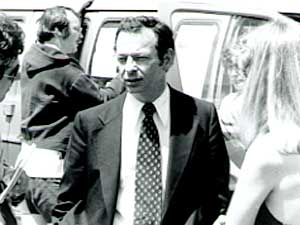|
Photos
More from MPR
Resources
Your Voice
|
BWCA fallout: 'The Minnesota Massacre'
October 21, 2003
The term Minnesota Massacre was a term largely adopted by the State's DFL Party. Independent Republicans likely had a much kinder name for the outcome of Minnesota's 1978 general election. That's when three of the state's most prominent statewide offices turned over from DFL to Independent Republican hands -- and fallout from the BWCA debate was one factor.
Duluth, Minn. — The dispute over the Boundary Waters Canoe Area Wilderness wasn't the only campaign issue in 1978. But it almost certainly was a factor in the defeat of DFL Congressman Don Fraser's bid for the U.S. Senate, and, to a lesser extent, that of DFL U.S. Sen. Wendell Anderson. Anderson was seeking election to the seat to which Gov. Rudy Perpich had appointed him.
(Gov. Wendell Anderson resigned his office in 1976 when then U.S. Sen. Walter Mondale became vice president under President Jimmy Carter. Fellow DFLer Rudy Perpich assumed the governor's office, and promptly appointed Anderson to finish Mondale's Senate term. That move had been dubbed by some "the self-anointing.")
Congressman Fraser, DFL-Minneapolis, was seeking the Senate seat held by Muriel Humphrey, who had been appointed to fill her husband Hubert Humphrey's term until the Nov. 1978 election. Hubert Humphrey had died of cancer in January, 1978.
 | |||
But Fraser's support for the Boundary Waters wilderness designation stirred a hornet's nest of opposition, especially from northeast Minnesota's heavily DFL Eighth Congressional District. Meanwhile, Wendell Anderson was seeking to hold the seat to which he had been appointed.
Anderson had become identified with the anti-wilderness faction. Neither Fraser nor Anderson could count on the other's supporters for help in the June DFL nominating convention.
Anderson captured his nomination first, but by a narrow margin. Fraser's bid was challenged by Doug Johnson, a state representative from northern Minnesota and ardent opponent of more restrictions in the Boundary Waters.
Fraser struggled through three ballots before getting the party's endorsement, in what's been described as an ugly and contentious debate. When Fraser approached the podium to accept, his words were drowned out by boos and whistles for eight minutes.
The Boundary Waters bill which was before Congress at the time, the Burton-Vento bill, fell short of the support needed to make it a plank in the DFL Party platform.
Meanwhile, businessman Bob Short stood in Fraser's path. Short, also a DFLer, had bypassed the party's endorsing convention and ran on a platform that included opposition to full wilderness for the BWCA.
With support from Independent Republican crossovers, Short defeated Fraser in the September DFL primary. But Short's bid ended in November, along with Wendell Anderson's.
While Anderson stayed generally away from the Boundary Waters issue, his IR opponent, Rudy Boschwitz, promoted a plan with new restrictions on motors in the region, and a ban on timber harvesting, mining and snowmobiling.
In November 1978, Boschwitz defeated Wendell Anderson, and IR Dave Durenberger beat Bob Short. Minnesotans had sent two Republicans to the U.S. Senate. They also unseated DFLer Rudy Perpich and put IR Al Quie in the governor's office. Completing the rout, a solid DFL majority in the Minnesota House became a stalemate, with 67 members from each party.
(Source: Troubled Waters: The Fight for the Boundary Waters Canoe Area Wilderness, by Kevin Proescholdt, Rip Rapson and Miron Heinselman)
|
News Headlines
|
Related Subjects
|

